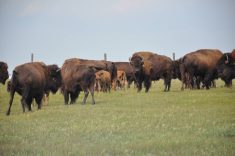The price of light bulbs on his family’s poultry farm was an illuminating experience for Fred Mertz.
The barns always seemed to need new light bulbs. When Mertz’s father wondered out loud how much they cost, no one had the answer. After tracking the cost of replacement bulbs, the family found it cost the farm $4,000 a year. They were able to cut that cost in half by buying bulk.
Years later, as an established accountant, Mertz realized the truth in the saying, by counting the pennies the dollars look after themselves.
Read Also

Canadian Food Inspection Agency slammed for handling of bovine tuberculosis case
The federal government leans heavily on producers to “take one for the team” and risk their livelihoods without any reassurance of support.
“Profits are measured by pennies a pound,” he said.
Mertz and his partners in Mertz and Associates are building a new kind of accounting firm in Calgary, where they take farmers beyond counting pennies.
Modern farmers face a daunting future, where some of them may not survive if they do not make radical management and lifestyle changes.
Mertz said he and his partners consider themselves business psychologists rather than accountants.
“Half my colleagues think we’re crazy and we should stick to taxes.”
Describing their service as a mission to help farmers on their life journey, Mertz developed a concept where the farmer becomes chief executive officer of the farm.
A business plan is built for each client and professionals such as bankers, agrologists, crop specialist, nutritionists and environmental consultants join the farm’s board of directors. They advise the CEO on ways to make the farm more efficient and profitable.
Mertz said it’s hoped that the professionals can make sense of the chaos found on most farms and create order.
“The present economic conditions have forced us to the table.”
The farm family begins the process by answering hard questions about what is happening with their business and personal lives.
They are asked what kind of lifestyle and income they want from the farm and how they want to spend their retirement.
A cry for help is one of the emerging patterns from these sessions, said Mertz. Farmers want assistance and they want to delegate more, but are not sure how to start.
Mertz’s concept is based on the idea that people are only existing and not living when they wear too many hats at the same time, such as technical co-ordinator, manager and entrepreneur.
Mertz said farmers who develop a corporate mentality can find experts to carry some of the load. They provide the information and he makes the final decisions.
The approach is not for everyone, he added. It requires independent individuals to overcome their reluctance to ask for help.
“Once we get over that hurdle, it’s like an ongoing marriage.”
Farmers develop three to five year projections with quarterly analysis to fine tune budgets and plans. They discuss risk management, which Mertz calls a weak link on many farms.
“If you see failures, it is because a certain risk was not recognized.”
Risk-protection tools include hedging, pre-selling, and using contracts.
Mertz’s firm also encourages off-farm investment. It makes sure people understand that diversification does not necessarily mean planting a new crop or buying a new species of livestock.
He and his partners may advise farmers to invest farm profits in non-farming assets.
Clients are usually younger farmers facing more debt and more challenges. They need to know what it is costing them to farm and whether the entire exercise is worth it.















